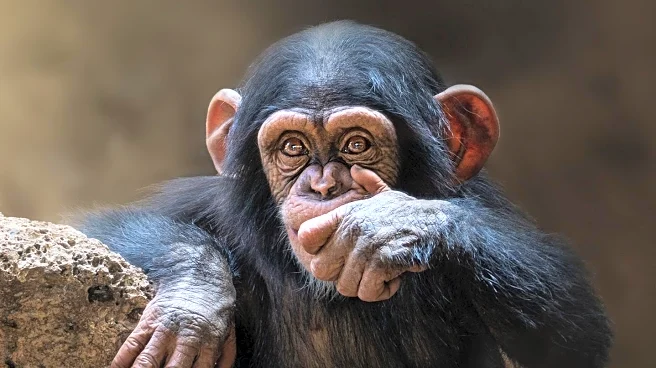What's Happening?
Jane Goodall, the renowned primatologist and conservationist, has passed away at the age of 91. Goodall was instrumental in changing the scientific community's understanding of chimpanzees, particularly through her discovery that these primates use tools. This revelation came during her early research in the 1960s when she observed chimpanzees using twigs to extract termites from mounds. Her findings challenged existing notions about the uniqueness of human tool use and prompted a reevaluation of what it means to be human. Goodall's work extended beyond research; she was a passionate advocate for animal conservation and established numerous sanctuaries and forest conservation programs worldwide.
Why It's Important?
Jane Goodall's contributions have had a profound impact on both science and conservation. Her discovery that chimpanzees use tools forced a reconsideration of the boundaries between humans and other animals, influencing fields such as anthropology, psychology, and biology. Goodall's work has also heightened awareness of the need for conservation efforts, as she dedicated much of her life to protecting chimpanzees and their habitats. Her legacy continues to inspire new generations of scientists and conservationists, emphasizing the interconnectedness of all living beings and the importance of preserving biodiversity.
What's Next?
The passing of Jane Goodall marks the end of an era, but her legacy will continue through the institutions and programs she established. Conservationists and researchers are likely to build on her work, further exploring the cognitive abilities of primates and advocating for stronger conservation measures. The scientific community may also continue to explore the ethical implications of her findings, particularly in relation to animal rights and the treatment of primates in research and captivity.
Beyond the Headlines
Goodall's work has also sparked discussions about the ethical treatment of animals and the moral responsibilities humans have towards other species. Her findings have contributed to debates on animal rights, leading to increased scrutiny of practices involving primates in research and entertainment. Additionally, her life story serves as a testament to the power of perseverance and passion in scientific discovery, inspiring many to pursue careers in science and conservation despite traditional barriers.










